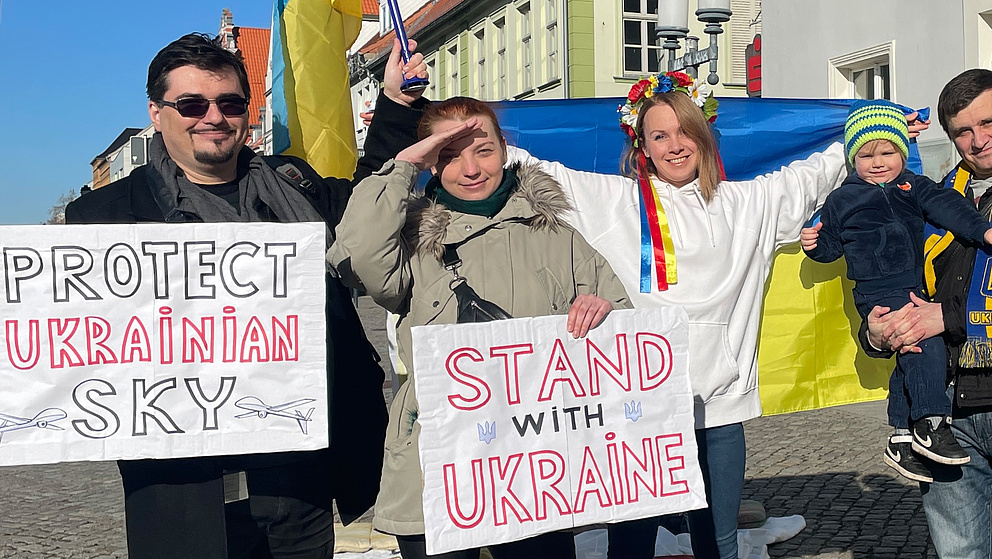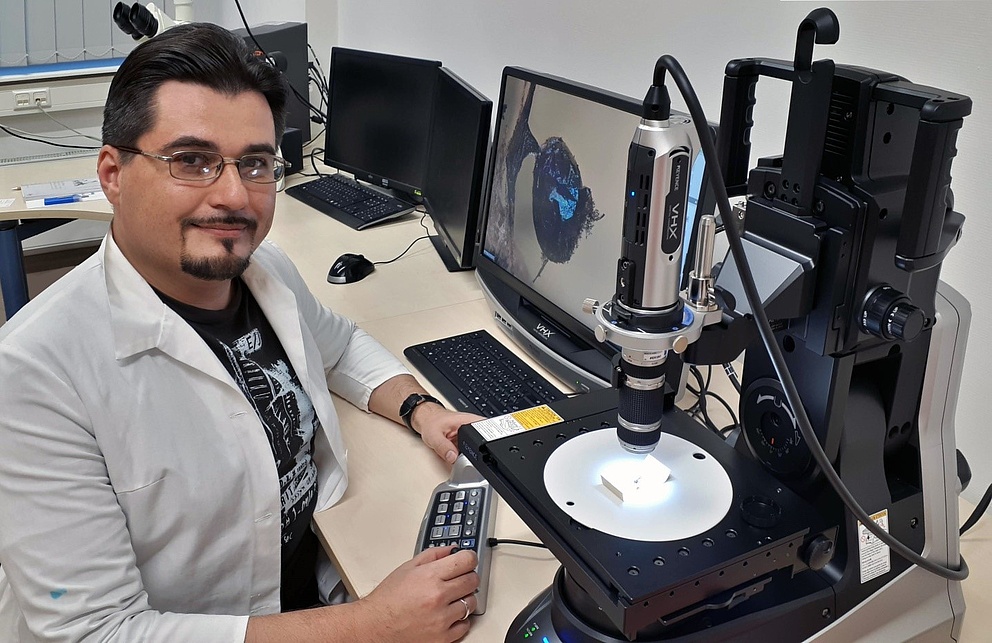

Contact
Press, Communications and Marketing
Tel.: +49 228 833-144
Fax: +49 228 833-441
presse[at]avh.de
Located in eastern Ukraine, Kharkiv is called the capital of the Ukrainian student community. It is also the hometown of Dmytro Leontyev who is currently working at the University of Greifswald as a Humboldt Research Fellow. Ukraine’s second largest city has a population of 1.5 million – and more than 30 universities. And it is now being hit by Russian rockets. We spoke with Dmytro Leontyev about the situation in Ukraine, about solidarity measures and cooperation with Russian colleagues.
Humboldt Foundation: Mr Leontyev, you are currently in Germany and are organising protests against the Russian attack on your country. How are you experiencing this situation?
Dmytro Leontyev: My wife and I are in safety here in Germany but that does not mean that we are calm. The situation reached a point that we couldn’t continue constantly watching the news – we would have gone crazy. So we started organising protests against the war and activities to signal our solidarity with Ukraine. The alliance Greifswald für alle (Greifswald for all) is also involved in these activities. The fourth gathering was held on Wednesday on the market square in Greifswald. The next one will be held on Saturday. I gave a speech there on Tuesday because I’m a professor and I try to explain the political situation and background to people. The mayor was also there. Together with other people from Greifswald, from Ukraine and, incidentally, Russia as well, we are currently collecting relief supplies that will be transported to the region.
Do you still have family in Ukraine and what have you heard from them?
The only place to hide is in the subway or in a cellar. Some people can’t even do that and have to stay in their flats. Our family and friends are in terrible danger in Kharkiv: my parents, my brother and his wife – who had cancer surgery just two days before the war started and was then directly released from hospital – and our daughter. She is 21 years old and is suffering greatly on a psychological level from all the fear. She has fallen into a deep depression. I can hardly talk with her. It is horrible. We are trying to maintain contact. Fortunately, that has been possible to date thanks to the joint efforts being made to maintain the infrastructure under great risk and with a lot of work. That is very reassuring to us. Most parts of the city still have electricity, internet and water.
Will the EU sanctions help end the war?
Germany has fortunately woken up. But too late! Europe should have acted sooner. That would have kept things from going so far. I keep hearing from people – especially here in eastern Germany – that they understand Putin. That is like a stab in the heart. I then tell them that we understand him better because we speak Russian! We try to convey to them Putin’s extremist ideology of hate towards neighbouring states.
The number of fallen Russian soldiers will not end this war. That is something that has never stopped a totalitarian ruler. The Russian Blitzkrieg failed. But the Ukrainian civilian population is giving enormous support to its army so now the Russians are fighting against the civilian population too. The European sanctions will work in the long term and we in Ukraine are very grateful for that. The Soviet Union also fell apart years ago because people had an increasingly hard time economically. In the short term however the only thing that will work would be to protect Ukrainian airspace.
What do you think of continuing individual collaborative research work with Russia?
After days of paralysing fear, we are now receiving messages of support from Russian friends as well. Researchers generally have a critical mind. So there is a high level of understanding among them of what is happening.
Many Ukrainian researchers worked with Russian colleagues in the past, but the annexation of the Crimea in 2014 put an end to most of these ties. Now I’m hearing from some of them that they will cease all collaboration until the war ends and I have full understanding for this. Naturally, everyone has to decide for themselves. But I can continue to work with anyone who tells me loud and clear that they condemn the Russian aggression that is taking place.
For example, I continue to work with Russian colleagues here in Greifswald in the department headed by my Humboldt host Professor Martin Schnittler. In addition, a young student in Moscow is assisting my work. He collects samples in the woods and gathers data for me so that I can include his name in one of my papers as co-author.
And what do you think of collaboration between institutions?
If you ask me whether we should continue official projects with Russia, I would say no. Europe has become too soft on people who support aggressive regimes around the world. Your openness lets them think that their views are tolerated here. It would of course be a kind of censorship – and censorship is not okay, scientists don’t like censorship one bit – but nonetheless this would be a good time to say, here is a red line that you cannot cross. Otherwise, you’re no longer welcome guests here.
Just like sport, science cannot keep out of politics completely. Scientists too enhance a country’s prestige and in doing so, whether they want to or not, the standing of the ruling regime.

Dmytro Leontyev
is head of the Department of Botany at the H.S. Skovoroda Kharkiv National Pedagogical University in Kharkiv, Ukraine. He is currently a Humboldt Research Fellow at the University of Greifswald. His research focus is protists which also include microscopic slime moulds. He is one of the few specialists worldwide with a profound knowledge of the evolution and classification of protists. Current plans foresee him remaining in Germany until the end of June. Asked about the future, he commented, “If my town is still under the Ukrainian flag in July, I will return. My family is there, my students are there.”

